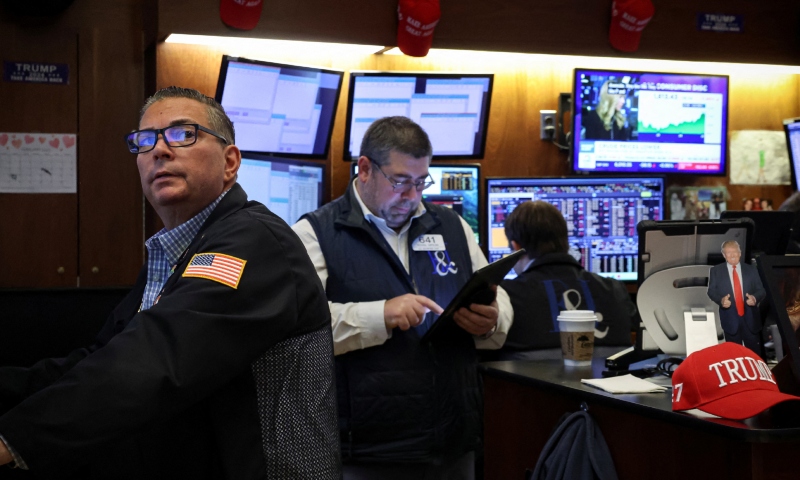- Web
- Feb 05, 2026
US stocks gain in choppy trade, as oil prices drop
-

- Reuters
- Mar 01, 2025

WASHINGTON: Wall Street indexes advanced in choppy trading on Friday, after briefly dipping following a contentious White House meeting with Ukrainian President Volodymyr Zelenskiy.
Oil prices fell on worries stoked by the White House meeting, tariffs and Iraq’s decision to resume exports from the Kurdistan region.
European shares ended flat but still notched another weekly gain.
An on-camera argument in the Oval Office broke out between US President Donald Trump and the Ukrainian President over a possible cease-fire agreement in the Russia-Ukraine war.
“The market initially sold off because it was a heated and contentious conversation, which is not usually a good thing between two leaders of the world,” said Adam Sarhan, chief executive of 50 Park Investments in New York.
S&P Global forecasts resilient banking sectors in UAE, Qatar, and Kuwait through 2025
“That’s why the market sold off, but then cooler heads prevailed.”
The S&P 500 climbed 1.59 per cent to end the session at 5,954.50 points. The Nasdaq gained 1.63 per cent to 18,847.28 points, while the Dow Jones Industrial Average rose 1.39 per cent to 43,840.91 points.
Volume on US exchanges was heavy, with 17.5 billion shares traded, compared with an average of 15.4 billion shares over the previous 20 sessions.
European stock futures fell, with the Dax and CAC40 futures down 0.6 per cent and the Eurostoxx 50 futures dropping as much as 1.4 per cent.
U.S. Treasury yields fell to new multi-month lows after a report closely tracked by the Federal Reserve showed annual inflation subsided and consumer spending slowed last month.
MSCI’s gauge of stocks across the globe rose 5.69 points, or 0.66 per cent.
Crypto prices tumbled as the Trump-fuelled boom fizzled.
Ukraine’s dollar bonds were down on Friday but reacted mutedly to the meeting’s chaos, holding on to earlier levels. The 2034 maturity fell just over one cent in price, last bid at 59.04 cents on the dollar, and set for monthly gains. The country’s international debt rallied strongly last year on hopes that Trump could negotiate an end to the three-year war with Russia, but bonds have wobbled over the past month as investors shift their views on the Trump administration’s approach to Russia and how that will ultimately affect Ukraine’s economy.
Earlier, the pan-European index ended flat.
The dollar index, which gauges the greenback against six major peers, rose 0.21 per cent to 107.59.
The euro fell by as much as 0.37 per cent to a two-week low of $1.036, before paring some of that decline to trade at $1.0366.
Emerging market stocks fell 28.01 points, or 2.49 per cent.
US DATA, TARIFF RISKS
The 12-month change in the US personal consumption expenditures (PCE) price index fell to 2.5 per cent last month from 2.6 per cent in December, US data showed.
The core PCE measure, the Fed’s preferred measure of inflation, fell to 2.6 per cent from an upwardly revised 2.9 per cent. The central bank targets an inflation rate of 2 per cent.
Both measures came in line with economists’ expectations.
The threat of escalating tariffs has boosted the dollar, but it has also stoked worries about the impact of widespread duties on the US economy.
The “report indicates that inflation remains sticky,” said Peter Cardillo, chief market economist at Spartan Capital Securities.
“That means the pause will continue. And that means that the Fed may have a dilemma on its hands because the recent macro numbers are cooling and it shows signs of the economy cooling.”
The prospect of higher US tariffs sent jitters through markets and revived concerns about an escalating global trade war.
Trump said on Thursday that 25 per cent duties on imports from Canada and Mexico will come into effect on March 4 – not April 2 as he had suggested a day earlier – and said goods from China will be subject to an additional 10 per cent duty. This week he also floated 25 per cent tariffs on shipments from the European Union.
Bitcoin fell 0.18 per cent to $84,138.56
The yield on benchmark US 10-year notes fell 6 basis points to 4.227 per cent, from 4.287 per cent late on Thursday.
The 2-year note yield, which typically moves in step with interest rate expectations for the Federal Reserve, fell 8.9 basis points to 3.991 per cent, from 4.08 per cent late on Thursday.
Spot gold fell 0.68 per cent to $2,856.49 an ounce.
US gold futures settled 1.6 per cent lower at $2,848.50.
Brent crude futures, which expired on Friday, settled at $73.18 a barrel, down 1.16 per cent. US West Texas Intermediate crude futures finished at $69.76 a barrel, losing 0.84 per cent.
MSCI’s broadest index of Asia-Pacific shares outside Japan closed 2.45 per cent lower at 576.86, while Japan’s Nikkei fell 1,100.67 points, or 2.88 per cent, to 37,155.50.




